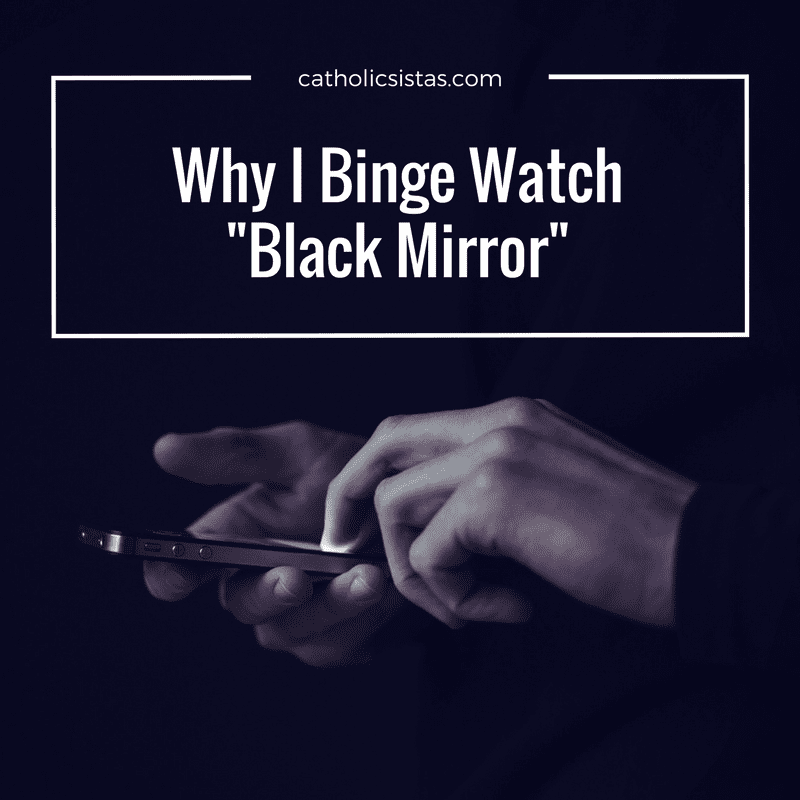Disclaimer
“Black Mirror” is a TV show filled with every “no” in the book: adult content and themes, violence, language, drug use. I would never, ever, EVER let my (at present, nonexistent) children watch it. To be honest, I wouldn’t recommend it to some of my adult friends. It’s a show that’s hard to stomach.
With that rousing disclaimer, you may be tilting your head, thinking…how could she possibly love this TV show? Stay with me here. I promise it gets good.

The Basics
We’ve all questioned the influence technology has on our lives. Does scrolling through Instagram lessen self-esteem? Should Google really know my location at all times? Does Facebook stalking help or hurt relationships? Are smartphones re-wiring kids brains?
Over the course of 3 Seasons, “Black Mirror” explores these questions—and take them to the extreme. It’s reminiscent of “The Twilight Zone.” There’s a new set of characters every episode. It takes us into the future (or a different present), showing us how our lives might be…or already are.
It’s hard to shake the feeling: “This could be us…”. As their creator stated, it’s: “…all about the way we live now – and the way we might be living in 10 minutes’ time if we’re clumsy.” (Source below). The black mirror is put up to our faces—and we see what technology is/could be doing to us.
Why I Love It
You might see now why I love it—our society (me definitely included) needs some serious introspection. My love was cemented by two episodes in particular (my husband and I stayed up super late discussing them—SO. GOOD.):
“Fifteen Million Merits” (Season 1 Episode 2)
This episode challenges the media, “reality” tv, online “selves,” and the impact these have on our “real” lives. The main question it asks are: in a world centered on entertainment, are our lives cheapened? (Answer: yes).
The whole episode is great, but I love it for a particular moment—a seemingly small but SUPER profound moment (I won’t spoil it all, because the reveal is great).
The main character finally gets to vent his frustrations publicly. One of the main “baddies” responds to the frustrations: “You are so articulating something we all…and I mean everyone in this hall, something we all agree on. Even though we might not comprehend all of it, I think I’m right in saying we do feel it. Even me. I know you’ve got me down as this creature. But, you know, hey, I get where you’re coming from and I like your stuff.”
“It’s not stuff it’s…”
“It’s truth. Am I right? Your truth, admittedly, but truth nonetheless.”
HOLD THE PHONE. The main character was standing up for Truth? The “baddie” was on the side of relativism?? I wanted to stand up and applaud. Because I’ve never seen relativism attacked so outright in a tv show, ever.
“Nosedive” (Season 3 Episode 1)
This episode really shook me. It presents a world where everyone is addicted to their phones (so, not much different than ours, right?). Their lives revolve around an app in which people are constantly rated (from zero to five stars). Feels a lot like what Instagram might be two or three updates from now.
These ratings effect your jobs, where you can live, who you hang out with, what you can buy. We experience this world through a main character (Lacie) who is sweet, funny, caring. She’s obsessed with raising her rating…she’s a 4.3 and wants to be over 4.5.
What really spooked me about his episode? Lacie. Is. Me. Lacie longs for love, to be appreciated, to be liked, to be affirmed by others—and I long for that too, so much. With Instagram and Snapchat, it feels like my life is constantly up for rating. I hunger for the “5 star” rating that Lacie is searching for—even, at times, to the point of cheapening my authentic self.
After the ending, I lay in bed, staring at the ceiling, seriously re-evaluating how I present myself…and what I look to for affirmation.
Black Mirror as Evangelization?
I heard about Black Mirror from some of my husband’s friends (they LOVE it). Admittedly, they might be drawn to Black Mirror by the “bad” stuff (see disclaimer above). But I love that they love it.
Why?
These friends aren’t Catholic, aren’t practicing a religion, aren’t really concerned with living a moral life. These are guys who would never read C. S. Lewis, Chesterton, or a Catholic Blog. They might never enter a Church or encounter a priest, ever. But by watching this show, they’re facing questions about relativism, authentic self…the list goes on. Maybe, just maybe, these questions might lead them to the Truth.
Source: Chalie Brooker, https://www.theguardian.com/technology/2011/dec/01/charlie-brooker-dark-side-gadget-addiction-black-mirror
